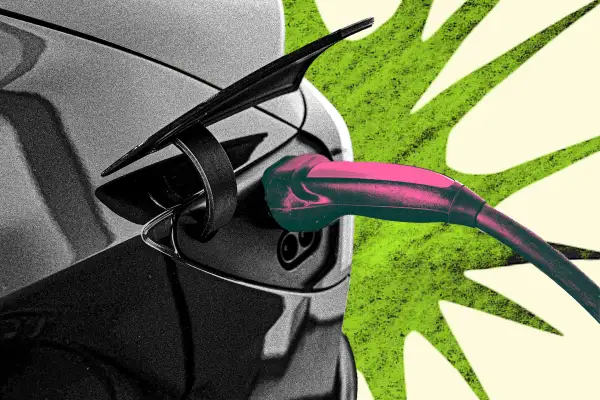Is 2024 the Year to Buy Your First EV?

This article is part of Money's new-year checklist — a 10-step guide to crushing your financial goals in 2024 (and beyond). For expert insights into new SECURE 2.0 Act retirement policies, the upcoming tax season and more, read our cover story.
The electric vehicle landscape is shifting rapidly as legacy automakers ramp production and unveil new models, leading many drivers to ask: Is 2024 the year to finally buy an EV?
The options are rapidly expanding. In 2024, Honda will release the Prologue (its first all-electric SUV), and Volvo is coming out with the EX30, a sub-$40,000 crossover. General Motors is introducing an electric version of the Chevrolet Silverado, its best-selling truck. Kia’s brand new three-row SUV, the EV9, is already generating buzz among excited drivers. Meanwhile, Volkswagen is readying the ID.7, a tech-loaded electric sedan roughly the size of a Passat, and making major updates to its flagship EV, the ID.4 SUV.
With those launches, Jeffrey Lear, director of product and strategy at Volkswagen of America, says consumers are getting access to “quality cars that are reliable from a trusted OEM [original equipment manufacturer].”
That could be what the EV market needs to gain its momentum back after a rough end to 2023, when EV sales were so disappointing that some manufacturers now admit they were too bullish and have scaled back their electrification timelines.
Edmunds consumer insights analyst Joseph Yoon says new EVs from automakers with brand-loyal customers should drive the EV revolution forward.
Take General Motors as an example. “They're fully aware that their customers said, ‘Hey, I’d love to buy an EV, but you don't make me a Silverado,’ and I'm sure every single legacy manufacturer is hearing this from their customers, as well,” Yoon says. “As soon as these legacy guys can get their big-volume-selling models out and provide electric alternatives, consumers no doubt will flock to them immediately.”
When they do, they’ll likely catch a break from the IRS. The EV tax credit — the largest consumer auto incentive ever — is on track to make EVs competitive with gas-powered alternatives in 2024 in terms of value.
That’s because there’s a notable change coming to the EV tax credit in 2024: EV buyers won’t have to wait to see the money until tax season, like they previously had to. Thanks to the Inflation Reduction Act, the credit will instead be applied upfront at the dealership, eliminating the need to finance at high rates while waiting for April 15.
“It's really hard to say no to a $7,500 discount,” Yoon says. “It's free money. And if you can take it, you should take it.”
Although the EV tax credit is structured to reward drivers who buy U.S.-made vehicles, there’s some flexibility. Lear says customers who want to drive the ID.7 sedan (expected to start around $50,000) won’t qualify conventionally for the EV tax credit because it’s assembled in Germany. But there’s a workaround: Shoppers can lease those cars and get the $7,500 of savings thanks to a loophole in the tax credit. Automakers are advertising these lease deals because it’s the only way for Americans to get the tax credit on EVs that don’t meet battery requirements or are more expensive than the tax credit’s limit.
Even buyers who aren’t used to leasing may want to consider it if they’re excited about a car like the ID.7, which Lear says will have about 300 miles of range and a 282 horsepower rear engine, giving it strong acceleration — 0 to 60 in about 5.2 seconds for the all-wheel drive version, Lear says.
His point? EVs can save you money and still be fun to drive.
“It's super aerodynamic. It's sleek. It’s a fastback,” Lear says. “And when you sit in the backseat of the ID.7, you feel almost like you're in a [BMW] 7-series.”
How to decide whether to buy an EV
It’s not the right time for everyone to buy an electric vehicle. Depending on your ability to plug in at home and your typical driving routes, the public charging infrastructure and the range of the EVs on the market today may be insufficient for your needs. Electric vehicles are also out of budget for many new car buyers, with an average sale price of $59,064 in October, according to Edmunds. (There are much more affordable options in the used EV market, though the tax credit is smaller.)
But if you’ve been meaning to make the switch, now may be a good opportunity. As a result of the inventory buildup, EV shoppers are looking at some of the largest discounts ever — more than $1,000 on average.
When you consider potential price breaks, the EV tax credit and not having to fork over $50 every time you need gas, going electric is making more and more financial sense. And that’s to say nothing of the environmental benefits.
Jessica Stafford, senior vice president of consumer solutions at Cox Automotive, recommends researching and comparing gas-powered models and electric alternatives to decide what’s best based on your needs and budget. But given the quickly changing EV landscape, she says you’d be wise not to wait too long.
“Early 2024 will be a good time for an EV purchase because supply will still be outpacing demand, so there will be downward pressure on prices,” Stafford says. “It’s hard to say what will happen to tax credits and government regulations for EVs long-term, but current incentives under the Biden administration should hold through [the] first part of 2024.”
More from Money:
These Car Colors Have the Highest (and Lowest) Resale Value
EV Fees: 8 States That Charge Electric Car Owners $200 or More Every Year

